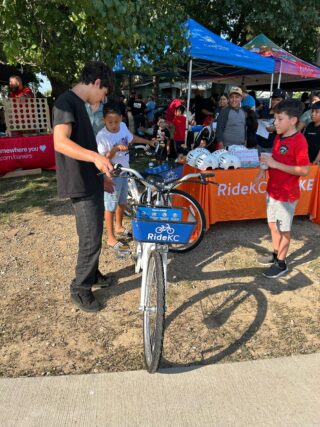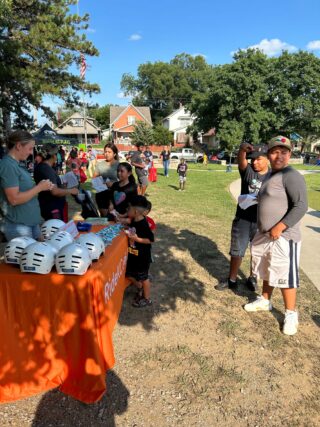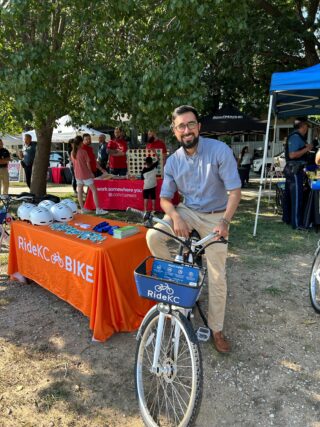Expanding Bike Share Access to Spanish-Speaking Communities in Kansas City
by Odochi Akwani, Writer and Content Manager
November 20, 2025
BikeWalkKC launches its Spanish-language version of RideKC Bike, along with a television spot and community engagement efforts to better connect with Spanish speakers.


BikeWalkKC is a nonprofit dedicated to making Greater Kansas City a safer and more accessible place to walk, bike, live, work, and play through advocacy, education, and community planning. BikeWalkKC also operates RideKC Bike, the region’s bike share system, which has been operating since 2012.
In 2018, BikeWalkKC introduced its Bike Share for All equity program, which engages local nonprofit and social service agencies that assist underserved and BIPOC individuals, to provide free or reduced-rate access to bike share. When the Better Bike Share Partnership announced our latest mini-grant round earlier this year, BikeWalkKC saw an opportunity to better meet the needs of its equity partner clients who had been requesting a Spanish version of the bike share app. They were awarded the funding to make this happen.
Through their software provider, Drop Mobility, BikeWalkKC could switch on the Spanish version of the RideKC Bike app. To get the word out to the Spanish-speaking community in the historic northeast neighborhood about the app, BikeWalkKC planned to host educational outreach events on how to use the RideKC Bike system and the Spanish-language app.
Unfortunately, as they were gearing up to host these events, the first ICE raids in Kansas City took place. Councilmember Crispin Rea, an ally to BikeWalkKC and a member of the Spanish-speaking community, helped the team pivot and rethink ways to engage with the neighborhood, enabling BikeWalkKC to participate in a couple of events that Councilmember Rea was already involved in.

Councilmember Rea
“I think the consensus was that segment of the population was understandably concerned about going to events,” says Eric Vaughan, director of bike share and business services at BikeWalkKC. “So [Councilmember Rea’s] input was, ‘Let’s get you to some events where they have a certain level of comfort already to help increase that turnout and exposure to the app,’ and the events we went to were very well attended.”
BikeWalkKC attended events like Night Out Against Crime and Vamos KC. Vaughan and other colleagues gave out information on using the app, the RideKCBike system, their Bike Share for All program, and hosted bike demos, providing safety tips and rules of the road. Vaughan noted that the bike demo was the hit of the Night Out Against Crime event.
“It was a very diverse age range. I had to turn away a lot of kids because they weren’t old enough to ride the bikes,” says Vaughan. “We had several seniors come up and have an interest as well, which isn’t too different from what we see normally in other demographic groups. The e-bikes, in particular, have a way of transcending age, so it really opens it up to all people.”
Another way BikeWalkKC is promoting the Spanish-language app is through a television spot on Telemundo that’s been airing this fall. They plan to also air it in the spring as the riding season kicks off as a reminder to residents, and for any Spanish-speaking visitors.
“Kansas City is one of the host cities for the World Cup in the summer,” says Amy Scrivner, development and communications director at BikeWalkKC. “So we are planting the seed in people’s minds that they can use this to get around, because it’s going to be chaos in terms of trying to drive a car.”
BikeWalkKC coordinates with the local bus service, with 40% of its bike share hubs co-located with bus and streetcar stops, seeing about 60% of bike share trips starting or ending near a transit stop.
With this app, BikeWalkKC aims to serve a broader group of people who need more transportation options. Many of their partner immigrant service organizations have expressed this need to BikeWalkKC, and the neighborhoods they focus on have the lowest rates of car ownership.
“As a fundraiser, I hope that we can attract other philanthropists to invest and start seeing bike share as not a leisure and recreation solely, but also as a necessary part of the transportation ecosystem that supports the upward economic mobility of all of our residents,” says Scrivner. “To do that, we need better language access, more languages accessible. That would be the ultimate goal, so this helps us prove that.”
_______________________________________________________________________________________
The Better Bike Share Partnership is funded by The JPB Foundation as a collaboration between the City of Philadelphia, the National Association of City Transportation Officials (NACTO), and the PeopleForBikes Foundation to build equitable and replicable bike share systems. Follow us on LinkedIn, Facebook, Twitter, and Instagram, or sign up for our weekly newsletter.
Have a question or a story idea? Email odochi@peopleforbikes.org
